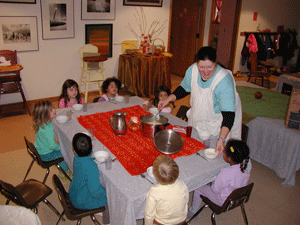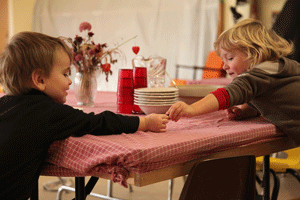 As children begin to develop their language skills it is important that their words and ideas are heard and acknowledged by the adults in their lives. Providing children with verbal and visual cues helps them to understand that they are being heard and will boost their confidence in their own words. Though it is important to listen to children, it is essential to frame conversation in such a way as not to leave too much choice or complicated thought for the child to have to cope with.
As children begin to develop their language skills it is important that their words and ideas are heard and acknowledged by the adults in their lives. Providing children with verbal and visual cues helps them to understand that they are being heard and will boost their confidence in their own words. Though it is important to listen to children, it is essential to frame conversation in such a way as not to leave too much choice or complicated thought for the child to have to cope with.
There are several young children at LifeWays who rely heavily on verbal cues to understand that their voice is being heard by the person they wish to be speaking to. There are many times when I will hear my name called and I will look attentively at the child requesting my ear and, instead of proceeding with their thought, they will continue to say my name. Though I am looking at them and clearly giving them my attention, they wait for a verbal cue that I am listening to them. This can be as simple as my saying, “Yes, Joey?” Visual listening cues are more understated and harder for young children who are just developing speech to grasp, but still very important. After I have verbally acknowledged a child wishing to speak with me, I provide visual cues such as eye contact and orienting my body towards the speaker, things that they will begin to understand equate to an attentive audience even in the absence of a verbal cue as they grow and further develop their speech.
A common subject that is broached by the children at LifeWays is, “What is for lunch today?” I must tread lightly and simply when I answer this question because there are some foods for which even the name will cause a bad taste in the mouth for many children. I always make sure that I answer this question as broadly and simply as possible. Instead of responding to the child, “We are having spaghetti noodles with red lentil sauce and corn, beans, carrots and peas,” I will simply reply, “We are having noodles with sauce and vegetables.” The first answer, being so detailed, leaves space in the child’s mind to focus on the parts of the dish that they dislike (or happen to dislike that day) and can sour the entire meal.
The broad and simple nature of the second answer provides a simple picture in the child’s mind that does not become complicated until they are served their meal. At the point the food is on the plate, a negative reaction to the food may be met with the simple statement, “Find something on your plate that you like and you may eat that.” This provides the child with a choice (eating some foods and not others) within a defined boundary (their plate), and shows them that their words were heard and taken into consideration. Too much choice is a problem for a developing mind and can lead to more issues rather than solutions. If given the choice, many children would eat candy and cookies for every meal because sweets always taste good. Or they may choose the same meal over and over because they know they like it, never expanding their repertoire.
Instead of asking children at LifeWays what they would like to eat for lunch, we provide them with a plate with several options on it and give them the simple choice of what is on that plate. There may be a day where lima beans are the most terrible and disgusting food in existence, followed a week later by a professed love for lima beans by the same child. It is important to guide the young child, while all the while nudging them in the direction that will lead to positive choices they can carry with them for their entire lives.
 Speech development occurs at a young age, when children will begin framing who they are as individual human beings. They must know that their words are heard and understood and that their thoughts and ideas truly matter. This can be achieved by providing verbal and visual cues while guiding children to positive decisions with limited choices, and avoiding conversation that may complicate or confuse the ideas that are running through their developing minds.
Speech development occurs at a young age, when children will begin framing who they are as individual human beings. They must know that their words are heard and understood and that their thoughts and ideas truly matter. This can be achieved by providing verbal and visual cues while guiding children to positive decisions with limited choices, and avoiding conversation that may complicate or confuse the ideas that are running through their developing minds.
Jeremy Bucher is a care giver at LifeWays Early Childhood Center, a Representative Program in Milwaukee, Wisconsin.
